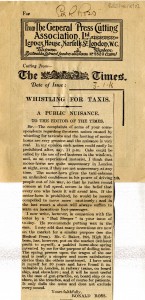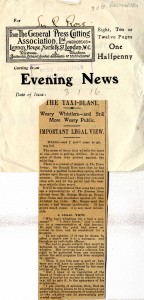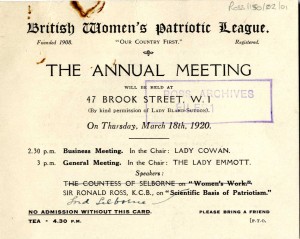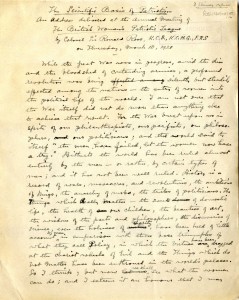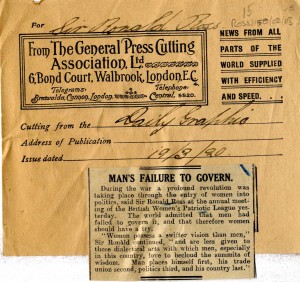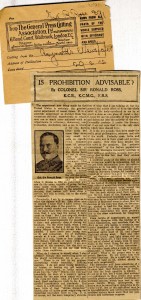This week I have been doing year 12 work experience at the LSHTM archives. I have had the chance to learn more about both archives and the history of the school. For this blog I have completed some research based on what’s in the Ross Archives.
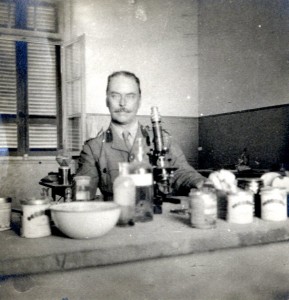
In 1914 Ross was sent to Alexandria for four months to investigate an outbreak of dysentery which was hampering troops in the Dardanelles.
Taxis in the First World War
You may assume that in 1916 most were preoccupied with the Great War (1914-18), however some were also bothered by issues closer to home. In the Ross Archives there are a number of press cuttings concerning whistling for taxis in the middle of the night. Sir Ronald Ross’ response to the Editor of the Times was published on the 3rd January 1916 and in this he expresses his discontent with late night whistlers. He suggests prohibiting whistling after 11pm and recommends that taxi drivers should shout to warn an ‘incautious foot-passenger’, rather than use the motor-horn. Other responses to The Times include one from ‘AN F.R.S.’ who disagrees with Sir Ronald Ross and proposes that the best remedy for light sleepers is to go to bed later, as ‘after mid-night there is now practically no whistling nor motor-horn blowing’. Six months after this exchange, in August 1916, it was announced that after 10pm whistling for taxi-cabs was prohibited.
While taxis were causing a nuisance in London, Paris cabs, albeit briefly, contributed to the Allied war effort. On September 6th 1914 the French Armies 7th Division arrived in Paris by train to join the 6th Division who were fighting in the Battle of Marne. The commanding officer of troops realised that there was no means available to transport his men from the train station up to the front. In response to this problem the commander-in-chief requested the enlistment of every available taxi driver and taxi in Paris; a convoy of 600 Paris taxis transported approximately 6000 reserve men to the Battle of Marne who contributed along with the help of the Allied Troops to the successful defeat of the Germans in that particular battle.
Suffrage campaign
On the 18th March 1920 Sir Ronald Ross delivered a speech at the annual meeting of the British Women’s Patriotic League. He begins the speech by stating that whilst the First World War was in progress a revolution was occurred, bringing the entry of women into political life with it. He criticises the leadership of men in the past, explaining that they focused too much on Policy and not enough on the health of children, the beauties of art and the wisdom of poets. Here he is expressing the widely held belief, shared even today, that men and women are fundamentally different but are of equal importance and intellectual ability. Women’s suffrage and role within society was a key issue of the time, and the role of the First World War in changing the status of women in Britain is still a highly contested issue.
The campaign for female suffrage began in the early 19th century, with the formation of The Women’s Suffrage Committee and the Manchester National Society for Womens’ Suffrage in 1866: this early campaign introduced women to modern politics and allowed them to gain experience in campaigning which they passed onto the later generation in the campaign. In the first decade of the 20th Century the better known National Union of Women’s Suffrage Societies (NUWSS) and the Womens Social and Political Union (WSPU) worked towards votes for women, using constitutional and militant methods respectively.
At the outbreak of war the WSPU launched a patriotic campaign; they organised demonstrations and meetings to encourage women to send their sons and husbands to work, they handed out white feathers, which represented cowardice, to men who weren’t fighting and renamed their paper Britannia in 1915. The NUWSS provided medical relief, found work for the unemployed and set up the Women’s Service Bureau. The East London Federation, led by Sylvia Pankhurst, condemned the war and supported conscientious objectors. They also opened up centres that provided free milk and advice for new mothers, set up restaurants selling cheap meals and continued their social work amongst the poor.
On the 6th February 1918 the Representation of the People Bill became law. This gave the vote to men over 21 (over 19 if they had fought in the war) and to women over 30 if they were on the local government register. 8,400,000 women gained the vote and they made up 39.6% of the electorate.
Sir Ronald Ross and Prohibition
Sir Ronald Ross wrote an article titled ‘Is Prohibition Advisable?’ which appeared in many newspapers, including the West Sussex Gazette and can be found in the LSHTM archives. In this article he argues that when he was in India he and other young officers would drink as much as they wanted to and that he had never seen young men ‘so fit and competent’. He adds that not drinking alcohol gives him the ‘placid contentment, let us say, of a cow’ and that ‘even after taking race and climate into account’ non-alcoholic nations are more hard-working but less inventive and vigorous than the alcoholic nations. This is an extremely controversial statement if viewed from a 21st century perspective.
More information on Prohibition in 1920s America:
During Prohibition the manufacture, transportation, import, export, and sale of alcoholic beverages was restricted or illegal. The aim of prohibition was to lower crime and corruption, reduce social problems, lower taxes needed to support prisons and poorhouses, and improve health and hygiene in America. Instead alcohol became more dangerous to consume, organised crime dramatically increased, prisons became overloaded and corruption was commonplace.
The 18th Amendment was introduced on January 16th, 1920 and gave the police the task of enforcing prohibition. The deaths from alcohol poisoning increased dramatically as a result of prohibition; bootleg alcohol was not produced under government supervision and often contained poisons and chemicals to give it a ‘kick’. Another failing of the 18th Amendment was that whiskey could still be obtained from medical doctors, and many doctors freely wrote prescriptions for ‘patients’ and as a result over a million gallons were consumed by the public each year in this way.
It was known that many prominent citizens, including President Harding, kept stocks of alcohol during prohibition leading to widespread contempt for authority. This resulted in a loss of respect for the law and more people began to drink illegally.
In 1933 the 21st Amendment was introduced which repealed Prohibition. States could decide to enforce prohibition individually and for a time 38% of Americans remained under prohibition. In 1966 all States had fully repealed the law.






